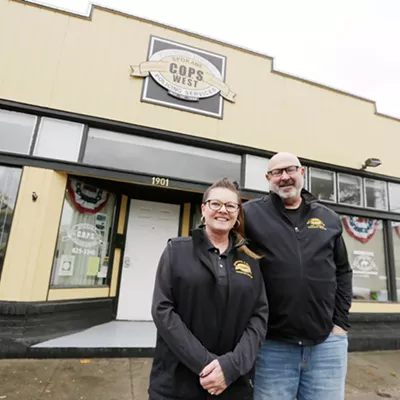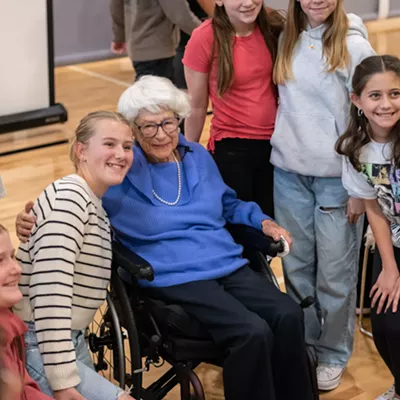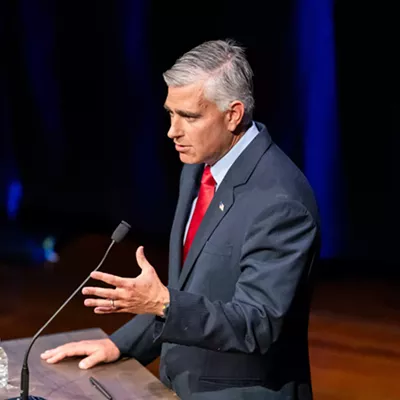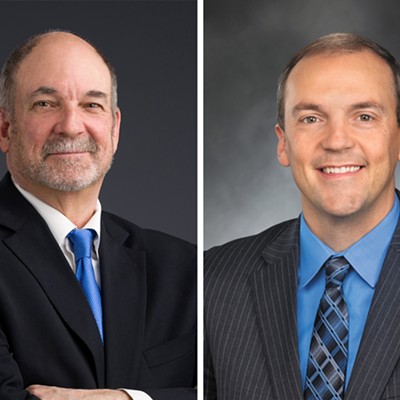
On Aug. 15, Spokane County Sheriff's Office Sgt. Clay Hilton used the chat feature on the department's computer system to send a message to a 911 dispatcher.
"well that went south fast," Sgt. Hilton said.
"Just had to get that last hoorah in there huh?" the dispatcher replied.
It was about three minutes after midnight, and Sgt. Hilton was at a parking lot in Terrace View Park in Spokane Valley, where he had just finished arresting someone. The subject of Sgt. Hilton's "last hoorah" was still at the scene, getting checked out by medics. He had a bloodied face and what would later turn out to be multiple broken ribs.
"Lol," Sgt. Hilton replied to the dispatcher.
Earlier that night, around 11:45, Sgt. Hilton had pulled into the parking lot to investigate a gray Audi wagon that was parked there after hours. Sgt. Hilton, who just happened to live across the street from the park, was on patrol working an overtime shift.
Kevin Hinton, 62, was inside the Audi trying to watch a movie on his phone. He was on his way home from a road trip to meet his new granddaughter in Oregon, and had decided to pull into the parking lot to get some rest.
Sgt. Hilton shined his flashlight through the window and told Hinton it was a crime to be in the park after hours.
Hinton agreed to leave, but when Sgt. Hilton asked for his ID, Hinton said he didn't have it. He also refused to provide his name when Sgt. Hilton asked for it. The encounter started to grow heated.
Sgt. Hilton told Hinton that he was likely going to jail for refusing to provide his name, and ordered Hinton to get out of his vehicle and face the car. Hinton began to comply, but objected when Sgt. Hilton took hold of his shirt.
"Don't put your hands on me, pal," Hinton said.
"You're going to get hurt if you don't listen to what I'm telling you," Sgt. Hilton replied.
A struggle ensued when Hinton tried to sit back down in his car. Sgt. Hilton struck him with his fist and dragged him out of the car by his feet. The deputy pushed Hinton to the ground and hit him several more times in the face and stomach — knocking out his false teeth, ripping his shirt and bloodying his face.
Other officers arrived on the scene soon after and helped put Hinton in handcuffs.
At 12:05 am, the dispatcher sent Sgt. Hilton another message.
"Glad you are alright. Did he start fighting with you?"
Sgt. Hilton replied an hour and twenty minutes later. By that point, medics had cleared Hinton to go to Spokane County Jail. But when a different officer took him there, jail staff refused to accept him because his injuries were too severe. They took him to Deaconess Hospital, where Hinton stayed for three nights.
"Yea...He was a No Person. But I think he may have learned a [lesson]..." Sgt. Hilton said to the dispatcher, misspelling "lesson" at first but quickly correcting it.
"Oh I am sure he did lol," the dispatcher replied.
"Wait for his booking photo," Sgt. Hilton said.
"Oh boy! I will! Scraps has been triggering me lately," the dispatcher replied, apparently referring to Spokane County Regional Animal Protection Service, which had been called to the scene to take care of a bird Hinton had in the car with him during his arrest. Records show that the dispatcher had called SCRAPS multiple times before getting a response.
Hinton's lawyers say the arrest left their client with eight broken ribs, a severe concussion, a punctured lung, a shoulder injury and a disfigured lip.
Spokane County Sheriff John Nowels placed Sgt. Hilton on paid administrative leave after learning about the incident in late September, and asked the Spokane Police Department to open an investigation. When graphic body camera video of the arrest surfaced in October, it sparked public outcry.
In February this year, Spokane police investigators concluded there was probable cause to charge Sgt. Hilton with second-degree assault. The charges were referred to the Yakima County Prosecutor's office, which is still investigating.
The chat logs — which were obtained through a public records request and viewed by the Inlander this week — shed additional light on Sgt. Hilton's demeanor immediately after the violent arrest.
Joshua Maurer, an attorney representing Hinton, says the tone of the chat messages is "pretty sickening."
It's concerning that any officer — especially a sergeant — would make fun of and laugh about a citizen they had just assaulted and arrested, Maurer says.
"Sgt. Hilton was proud of his actions," Maurer says. "He told the dispatcher to look at the booking photo because that was evidence of the 'lesson' Sgt. Hilton taught Mr. Hinton."
Maurer says it's also troubling that Sgt. Hilton saw Hinton's perceived status as a "No Person" as justification for assaulting him to the point of breaking his ribs and puncturing a lung.
Despite knowing the communications would be recorded, Sgt. Hilton "shows no remorse, or even concern over being disciplined," Maurer says. "Instead, he is laughing and bragging about what he had done."
Sheriff's Office spokesperson Mark Gregory says the department has been advised by legal counsel not to make any statements on the pending investigation. He says the department is taking the matter seriously, and that an internal investigation into the incident is underway.
"We have no comment," says Lisa Elliot, the attorney representing Sgt. Hilton.

'TROUBLING' RHETORIC
The chat logs were included as part of the Spokane Police Department's investigation into the excessive force complaint.
The report is nearly 1,000 pages long. It includes excerpts of Hinton's interview with an FBI investigator and findings from a third-party independent investigator. In the interview with the FBI, Hinton says he has had memory problems and frequent headaches ever since the incident.
The third-party investigator concluded that there was "no evidence that Mr. Hinton possessed a weapon, made a verbal threat or that he was trying to overpower or strike Sergeant Hilton."
The Spokane police officer tasked with investigating the incident said Sgt. Hilton's interaction with Hinton was "both objectively unreasonable and [lacking] the requirements of reasonable care."
"The continuation of force deployed by Sgt. Hilton became increasingly unnecessary; ending with blows delivered even after Mr. Hinton had become passive, with hands extended, just as Sgt. Hilton had commanded him to do," the investigator wrote.
The report also contains copies of Sgt. Hilton's chat logs with other officers from the day of the arrest.
Shortly after noon on Aug. 14, about 12 hours before the arrest, another deputy sent Sgt. Hilton a message asking if he had completed "that duty to intervene training."
That was apparently a reference to a required training about officers' responsibility to report wrongdoing and intervene when they witness another officer using excessive force. The Washington State Legislature passed a law requiring the training in 2021 as part of a slate of police reform measures. Officers were required to complete the training by December 2023.
On the day of the violent arrest, Sgt. Hilton hadn't taken it.
"Nope," he replied to the other deputy. "I hear its bad."
"Waste of time," the other deputy responded.
At 11 pm — less than an hour before his encounter with Hinton — Sgt. Hilton sent a message to a different deputy about a man who appeared to be high on drugs.
"That dude in the beanie and no shirt is FN high as a kite," Sgt. Hilton said.
"Another planet," the other deputy replied.
"should taser laser him from a mile away. LOL" Sgt. Hilton said.
"he'd prob think it was aliens," the other deputy said.
"Zombie," Sgt. Hilton said.
"Tweaker chicks keep walking up to him too...Got game," Sgt. Hilton added.
"They can tell he has good dope," the other deputy said.
"clowns," Sgt. Hilton said.
Maurer, the attorney for Hinton, says the tone of the chat messages is concerning.
"Even when used in a joke, no one deserves to be the target of violence, and to see evidence of officers engaging in this type of rhetoric is troubling," Maurer says. "Especially from officers who have both the authority and opportunity to use their tasers as they deem appropriate."
Law enforcement officers take an oath to serve their communities, Maurer says.
"They may not like the crime, or the individuals participating in the crime, but professionalism would argue that they should rise above that in order to perform the oath they took," Maurer says.
EXCESSIVE AND 'OBJECTIVELY UNREASONABLE'
The Spokane Police Department report also raises questions about whether Sgt. Hilton knowingly attempted to cite Hinton with a criminal charge that didn't apply to the situation.
Shortly before the arrest turned violent, body camera footage shows Sgt. Hilton telling Hinton that being in the park after hours was a crime. Hinton disagreed.
"That's a crime? No it's not," Hinton said.
"You wanna bet?" Sgt. Hilton replied.
"It's a civil offense," Hinton said.
Hinton was correct. In Spokane Valley, being in a park after hours is only a class three civil infraction — not a misdemeanor.
But after the arrest, Sgt. Hilton tried to issue Hinton a criminal citation for being in the park after hours, in addition to obstructing and resisting arrest.
Instead of entering the code number for Spokane Valley's law against being in parks after hours (which is just a civil infraction) Sgt. Hilton entered the code for the city of Spokane's law against being in parks after hours. In Spokane, being in parks after hours is a misdemeanor. But the city's laws aren't enforceable in Spokane Valley.
The report writing software that the Sheriff's Office uses has safeguards to prevent officers from accidentally entering the wrong charges. The misdemeanor charge Sgt. Hilton selected only shows up if what's known as an "ORI" number for the Spokane Police Department is first entered, the report says.
Had Sgt. Hilton entered the ORI number for his own agency, the criminal charge wouldn't have shown up, because it doesn't apply in that jurisdiction. Sgt. Hilton intentionally chose the ORI number for the wrong agency, the report says.
"It would be hard to find any officer that does not know his ORI number," the investigator wrote. "They are one of the first things taught in the introduction to the agency."
In the weeks following the arrest, Spokane County Superior Court staff rejected Sgt. Hilton's charge because it couldn't be entered into the court's computer system.
"Based on the criminal citation and accompanying police reports, there is evidence [Sgt. Hilton] recognized this error sometime after the arrest while Hinton was still in custody," the investigator wrote. "Sgt. Hilton then completed a sworn charging document and sworn police reports with knowledge that Hinton's presence in the parks after hours constituted only a civil infraction. On those same documents he utilized a neighboring municipalities [sic] park statute in place of those of his own jurisdiction."
In the weeks that followed, emails show Sgt. Hilton stating that he "intentionally disregarded" the Spokane Valley municipal code, the police investigator wrote. The prosecutor's office declined to file charges against Hinton after viewing the body camera footage.
Because Sgt. Hilton lacked legal grounds to make an arrest, any force he used was unreasonable, the third-party investigator wrote.
Even if Sgt. Hilton was correct in his belief that being in a Spokane Valley park after hours was a criminal offense, the force he used was still "excessive, objectively unreasonable and inconsistent with generally accepted police practices," the investigator wrote.

























